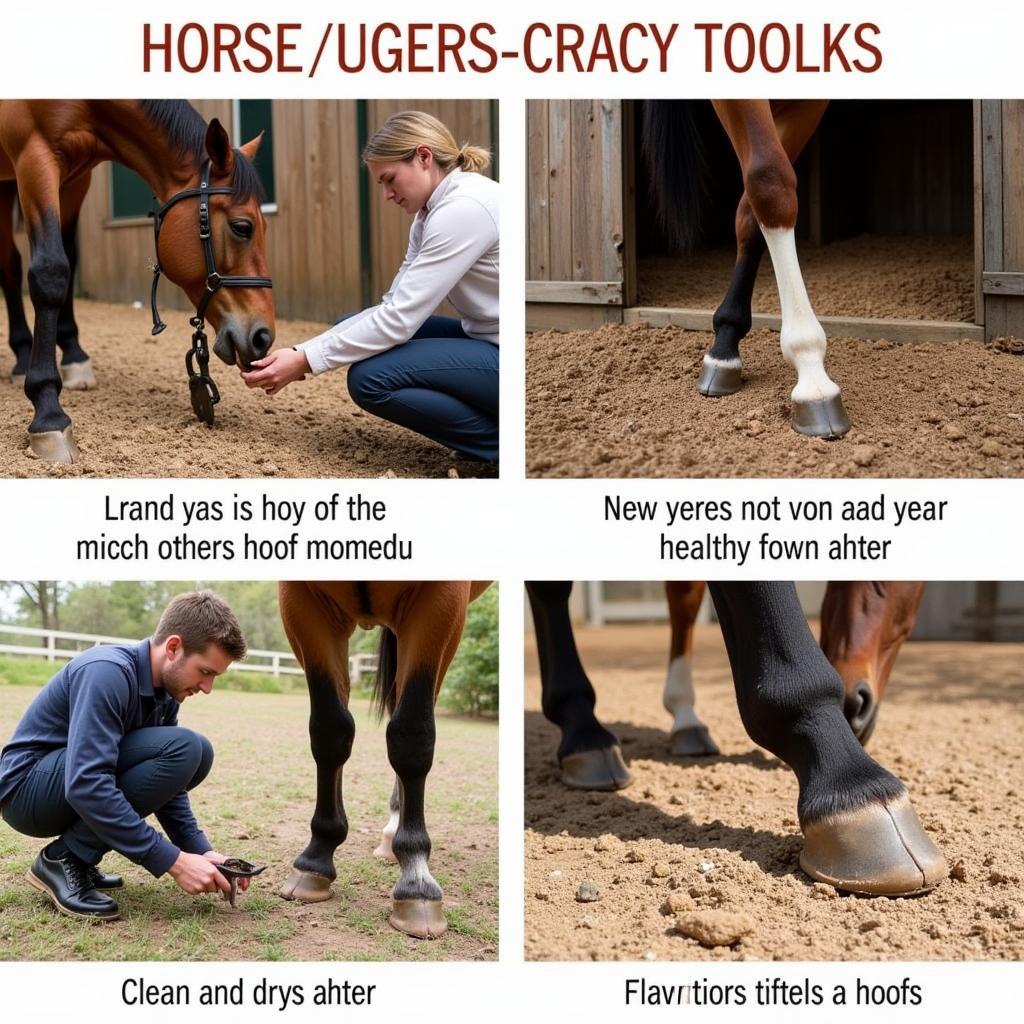A Foot Sore Horse can be a distressing sight for any horse owner. This common ailment can cause a range of symptoms, from mild limping to severe lameness, and understanding the causes, symptoms, and treatment options is crucial for ensuring your equine companion’s swift recovery.
Recognizing the Signs of a Foot Sore Horse
Identifying a foot sore horse early is vital for effective treatment. Some common symptoms include:
- Lameness: This is often the most noticeable sign, ranging from a slight head bob to a complete refusal to bear weight on the affected foot.
- Heat in the Hoof: An increase in hoof temperature, particularly around the coronary band, can indicate inflammation.
- Increased Digital Pulses: Stronger than usual pulses in the arteries running down the back of the pastern can be a sign of pain and inflammation in the foot.
- Reluctance to Move: Foot soreness can make horses hesitant to walk, trot, or turn, and they may show signs of discomfort when asked to move.
- Abnormal Stance: A horse with foot pain may adopt an unusual stance, shifting their weight to relieve pressure on the affected area.
Common Causes of Foot Soreness in Horses
Several factors can contribute to foot soreness in horses, including:
- Abscesses: These are painful infections within the hoof, often caused by bacteria entering through puncture wounds or cracks.
- Bruises: Just like us, horses can bruise their hooves, especially on hard or uneven ground.
- Laminitis: This serious condition involves inflammation of the laminae, the sensitive tissues that attach the hoof wall to the pedal bone.
- Navicular Disease: Affecting the navicular bone and surrounding structures, this degenerative condition can cause chronic foot pain.
- Thrush: A bacterial infection of the frog, thrush thrives in moist, unsanitary conditions and can lead to lameness.
Effective Treatment Options for Foot Sore Horses
Once you suspect your horse is foot sore, it’s crucial to contact your veterinarian immediately. They can accurately diagnose the cause of the problem and recommend the appropriate treatment, which may include:
- Rest and Restricted Activity: Allowing the horse to rest and limiting movement is crucial for healing.
- Corrective Shoeing or Trimming: Your farrier can help address issues with hoof balance and support, alleviating pressure on painful areas.
- Medications: Anti-inflammatories, antibiotics, or pain relievers may be prescribed to reduce inflammation, combat infection, and manage pain.
- Poultice and Bandages: Applying therapeutic poultices and bandages can help draw out infection, reduce inflammation, and protect the affected foot.
- Surgery: In some cases, surgical intervention may be necessary, particularly for conditions like abscesses or severe navicular disease.
Preventing Foot Soreness: Proactive Care for Happy Hooves
Prevention is always better than cure, and taking proactive measures can help safeguard your horse from foot soreness:
- Regular Hoof Care: Schedule routine farrier appointments every 6-8 weeks for proper trimming and shoeing.
- Maintain Clean and Dry Stalls: Ensure your horse’s living environment is clean, dry, and free of excessive moisture, which can contribute to thrush.
- Provide Adequate Footing: Inspect pastures and riding areas regularly, removing rocks, debris, and other hazards that could cause hoof injuries.
- Balanced Diet: Feeding a balanced diet, appropriate for your horse’s workload and age, is essential for maintaining healthy hooves.
 Essential Horse Hoof Care Practices
Essential Horse Hoof Care Practices
Conclusion
A foot sore horse can be a worrisome experience for any horse owner. By being able to recognize the signs, understand the causes, and provide prompt treatment, you can play a vital role in ensuring your horse’s swift recovery and continued well-being. Remember, early intervention is key, so always consult your veterinarian and farrier for the best possible care for your equine companion.
Don’t forget to check out our articles on [horse shower], [muddy horse] and [boots for riding horses] for more information on horse care.
FAQs
Q: Can I treat my horse’s foot soreness myself?
A: While it’s tempting to address the issue yourself, it’s crucial to involve your veterinarian for an accurate diagnosis and treatment plan.
Q: How long does it take for a foot sore horse to recover?
A: Recovery time varies depending on the severity and cause of the foot soreness.
Q: What are some signs that my horse’s foot soreness might be serious?
A: If your horse exhibits severe lameness, swelling, heat, or discharge from the hoof, immediate veterinary attention is critical.
Q: How can I prevent my horse from getting foot sore?
A: Regular hoof care, a clean living environment, and proper footing are crucial for preventing foot problems in horses.
For any further questions or concerns about your horse’s health, please don’t hesitate to contact our team of experts.
Need assistance with your horse’s hoof care? Contact us at:
Phone Number: 0772127271
Email: [email protected]
Address: QGM2+WX2, Vị Trung, Vị Thuỷ, Hậu Giang, Việt Nam
Our dedicated customer support team is available 24/7 to address your queries and provide guidance. You can also explore our website for informative articles on [root & bone horse shoe nc] and [exercises for horses topline].